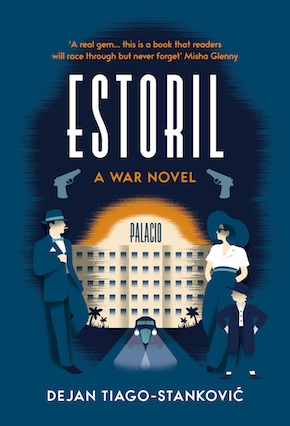The Grand Casino Estoril
by Dejan Tiago-StankovićHe opened his eyes to darkness. He was lying on his back among the crumpled sheets and crushed scattered pillows. He did not know whether it was the church bells that woke him up or the blackbird singing in the laurel bush under his window. He did not even know what time of day it was; he was still too dazed to count the bells, and since there was no light he could not see the dial on his wristwatch. Judging by the sound of the voices in the hallway, of the distant murmuring and doors opening and closing, he guessed the day was well under way.
He moved carefully to get out of bed, the way you do when you get up in the dead of night; he sat on the edge of the bed for a few seconds, his feet planted on the floor, and tried to pull himself together. Afraid that if he put it off for much longer he might have a change of heart and go back to bed, he mustered all his strength and stood up. He teetered the few steps to the window and pulled back the curtains. The little light that managed to seep through the cracks of the closed shutters sufficed for him to look at his watch. There was no need to hurry; he had slept through breakfast and it was still too early for lunch. He opened wide the wooden slats of the shutters.
Blinding sunlight poured in and the rhythmic chirping of crickets seemed to pulsate through the air. Wisps of a breeze wafted into the room, replacing the stale air, diluting the bad breath of the man who had sobered up in his sleep, alleviating the stench of tobacco smoke that permeated his clothes and hair after a heavy night. Vestiges of the recognizable smell of recent love-making and traces of perfume disappeared in an instant. Slowly, unsteadily, he made his way to the bathroom. Sometimes you find that in the morning the room tends to sway a little.
Popov was a regular guest. Without even ordering he was served a black coffee, à la turque, to clear his head, and a glass of water to quench his thirst from the night before.”
Not half an hour later, Duško was sitting in the half-shade of the hotel garden’s pergola, freshly shaven, perfumed, immaculately dressed, a flower in his lapel and, most importantly, smiling. The waiter wished him a good morning.
The tinge of empathy in the waiter’s smile only showed that there were no secrets at the Palácio. His smile proved that the waiter had sensitive information about this guest. Colleagues from the night shift had told him that Popov had again been observed in the early hours of the morning, returning from the casino in the company of not one but two ladies, and it was not until dawn that they emerged from his room. There was that genuine respect that men naturally feel when they recognize a great military leader, hunter or charmer.
Popov was a regular guest. Without even ordering he was served a black coffee, à la turque, to clear his head, and a glass of water to quench his thirst from the night before. The waiter tried to leave a bread roll on the table as well, but the guest waved it away as if the very sight of it made him sick. The waiter then discreetly suggested that while waiting for lunch the gentleman might at least have a little snack. Fruit perhaps. The offer was met with a smile and polite shake of the head, and the waiter, seeing that his efforts were in vain, bowed and withdrew. He did not even offer to bring the guest the newspapers; he knew there was nothing in the news that would amuse him.
You know that feeling when you think that somebody is looking at you? Sitting in that same translucent shade, just a few tables away, was another guest: a tall, lanky man, around Popov’s age, maybe a year or two older. He was wearing a superbly tailored navy blue suit that was too warm for the weather, and reading an issue of the London Times that was several days old. He appeared to be taking a keen interest in Popov; he kept peering from behind his newspaper. Although sitting sideways, Popov could feel the man’s eyes on him.
Popov paid little attention to men, but he could hardly be unaware of the long-legged Englishman. On the second day, the new guest followed him wherever he went. Popov’s demeanour and attitude had always attracted attention; he was used to being an object of curiosity and it did not bother him. But having somebody’s eyes obsessively trained on him like that had only happened to him a few times before, always with women, and he knew how to handle women, even obsessive ones. Whether the Englishman was crazy or simply did not realize that he appeared aggressive, the point was that he kept looking around and glancing at Popov. For want of a better solution, Popov pretended not to notice.
***
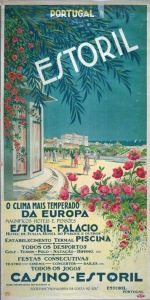 On that first day of August 1941, Duško Popov was lunching with one of the ladies he had recently been seeing in the privacy of his room. She was an American, the young wife of a financial magnate, on her way home to New York from Switzerland. Even though she occupied all his attention, and from their laughter you could tell that they were clearly enjoying each other’s company, Duško could not relax, unable to ignore the Englishman. The man had somehow managed to get a table next to theirs in the restaurant and he spent his lunch eavesdropping on their conversation, which, to be honest, was just lighthearted nonsense of no interest to anyone but the flirting couple.
On that first day of August 1941, Duško Popov was lunching with one of the ladies he had recently been seeing in the privacy of his room. She was an American, the young wife of a financial magnate, on her way home to New York from Switzerland. Even though she occupied all his attention, and from their laughter you could tell that they were clearly enjoying each other’s company, Duško could not relax, unable to ignore the Englishman. The man had somehow managed to get a table next to theirs in the restaurant and he spent his lunch eavesdropping on their conversation, which, to be honest, was just lighthearted nonsense of no interest to anyone but the flirting couple.
After they finished their coffee, Duško escorted the young woman to her hotel, where her husband was waiting for her; he was too concerned with his business to worry about the company his wife was keeping. Instead of going to the promenade, as he usually did, Popov decided to return to the Palácio. The fatigue of the previous night had caught up with him. Lino was, of course, waiting for him at the front door.
“Monsieur Popov, I asked around,” the concierge said in a conspiratorial voice. “He is indeed English, his name is Fleming. Ian Fleming. He is registered as working for the Ministry of Agriculture. He is staying in the room right opposite yours. He’s probably a secret agent.”
Popov said nothing, he merely smiled his thanks and slipped a tip into Lino’s pocket as he always did.
“How do you learn all these things?”
The concierge did not answer. He stopped the conversation in order to help an old lady who was lost.
“Come on, at least tell me how you know he is a secret agent,” Popov persisted.
“How do I know?” It was next to impossible to get an answer out of the moustachioed Lino. But he was prompted by another note slipped unobtrusively into his pocket. “I remember him from before. He was here not long ago, but under a different name.”
“Maybe he’s just on the run. Lots of people like that use false names.”
“People on the run don’t come back. And this man has huge telephone bills. That’s a sure sign that he’s reporting something to somebody.”
“I’ll take you on faith, but then give me one good reason why anyone would be following me? Of what interest would I be, and to whom?”
“Don’t sell yourself short, Sir,” Lino laughed before dropping his voice, as if telling a joke. “Here everybody is following somebody else. They are following you as well. He’s probably not the only one, it’s just that the others are more discreet about it… But one thing is for sure: he is following you today. Please come over here for a moment.”
They stepped to the side, so as not to be visible from the front door. And a minute later, there was Fleming, they could see him through the glass picture window, heading their way. His long strides brought him rapidly to the front door. Manuel opened it with a “Good afternoon”. The Englishman returned the greeting as relaxed as relaxed could be and then spotted the grinning Popov waiting to ambush him. As if caught in the act, the Englishman looked away, turned red in the face and left more quickly than he had arrived.
“Maybe the guy has a little crush on Monsieur?” laughed the concierge.
***
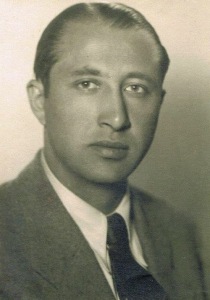
Duško Popov in 1940. The Serbian playboy and double agent is considered one of Ian Fleming’s primary inspirations for the character of James Bond.
The room was cool and in semi-darkness. Duško walked in but did not carry out his routine inspection. He had stopped doing that a long time ago; there was no point. Whenever he checked his room he invariably found signs that it had been searched, but that never bothered him particularly because he knew there was nothing compromising to be found.
He sat down on the chair and looked at himself in the mirror. The day had left him slightly sunburned. He slowly undid his tie and took off his shoes. He headed for the bathroom and standing barefoot on the cold stone floor he noticed something: the toilet seat was up. That pleased him but first he finished what he had come to do, flushed the toilet and only then climbed onto the toilet bowl, rolled up his sleeve and reached down into the water tank above. The packet was unusually big this time. He opened the tin box, unwrapped the waterproof cloth and found what he was expecting. The envelope said: $38,000. As agreed a few days earlier, the Abwehr had sent him the money he needed for America. He crumpled the thin tin of the box into an unrecognizable little ball, slightly bigger than a marble, then he tore up the cloth, set fire to it and held it over the sink to burn. He threw the remains into the toilet, flushed the water again, leaving not a trace of the packet, except, of course, for the money. He put it in the drawer of the night table next to his bed, without counting it. Germans were not prone to lie, and even if he had discovered a mistake, he was unlikely to be compensated.
***
“Bonsoir, Monsieur Popoff. Bonne chance. Good luck,” the liveried security man wished him, bowing as he opened the door to the casino.
It was a warm night. The casino was full. Popov had noticed that his English shadow had abandoned him, which made him very happy, but as soon as he entered the casino he spotted him again, sitting at the roulette table with some German officers, placing his paltry bets, one chip at a time. And losing each time. He was so focused on squandering his money that he did not immediately notice Popov, but once he did he looked him up and down, from head to toe. He noticed the elegant bow tie, the amber cufflinks, the white dickey, the polished shoes and bulge under the silk lapel of his tuxedo. He presumed Popov was carrying a gun.
Although Duško had heard too many stories like this before, he listened to her attentively, all the while gazing into her eyes as if he understood her suffering.”
Popov was in no hurry. He sat down at the bar, ordered a drink, looked around and casually started up a conversation with a Frenchwoman who had a very pale complexion and copper-red hair. By the second glass she was telling him her life story. She was travelling, she herself did not know where to go. She had been stuck here for months because her mother was ill. Although Duško had heard too many stories like this before, he listened to her attentively, all the while gazing into her eyes as if he understood her suffering, and for the first time in a long while she felt that somebody really cared about her. At the right moment, when he sensed that she had overcome her fear of strangers, he invited her to join him at the card table and play a little baccarat just for fun. She surprised herself by saying yes.
***
The baccarat table was quiet. A very short Lithuanian of unprepossessing appearance was holding the bank. He probably was not as rich as he wished to appear, and having nothing else to offer, he opted for a bombastic display of confidence. Popov had seen him before, strutting around the casino. Instead of stating the ceiling when holding the bank, as was the norm, he had the strange habit of high-handedly announcing “Banque ouverte”, which meant that there was no ceiling. This is considered improper among serious gamblers because it would mean accepting all bets, giving an unlimited advantage to people with money to risk.
“Banque ouverte,” he said again.
Again the croupier did not warn him about breaking the established rules; instead, without giving it a second thought, he invited the players to place their bets.
Perfect! Popov had hit upon a sure bet of his own. And he would have a large audience for it. The Englishman had made a mistake; Popov did not have a gun in his tuxedo pocket, it was a big wad of money, thirty-eight thousand dollars to be exact. Popov had meant to put it in the hotel safe but he was sidetracked and forgot about the money in his pocket. It came in handy now.
So the arrogant Lithuanian now handed our Duško the trump card he was waiting for. Popov first let everybody at the table place their bets and then took the wad of money from his pocket and tossed it onto the green velvet table as casually as if he was tossing a penny into a fountain for good luck.
“Thirty-eight thousand US dollars,” he announced. Nobody was likely to match that amount of money.
Everybody at the table was probably rich in some way, but few of them had had the opportunity of seeing so much cash piled up in one place. Let alone of seeing somebody toss it onto the table like a pack of cigarettes. The bundle of greenbacks was so thick that Popov could have said it was two hundred thousand dollars and they would have believed him. The table suddenly fell silent; everybody was waiting with bated breath to see what would happen. The unassuming Frenchwoman, who had no idea what was going on, went quite still. But it was the Lithuanian who was the most upset by the situation; he had no way of beating Popov – no one in his right mind carried around that much money. No one matched Popov’s bet. The Lithuanian was in trouble and he quietly folded. Silence. According to the rules of the game, Popov had only one option left: to collect everything on the table. He had won big, but as he rose to his feet he started grumbling about the casino’s irresponsible management. He was right too. The allure of gambling is something other than raking in the money. Walking back to the bar, arm in arm with the redhead, he caught a glint of admiration in the ever-present Fleming’s eye.
***
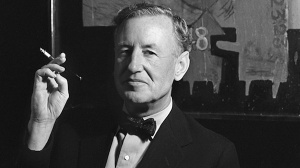
Ian Fleming © Cecil Beaton Studio Archive at Sotheby’s
That evening the casino was full until late into the night. Here in the south-west of the Continent, the sun rises later in the summer, and so what we call the small hours of the morning came later as well. But right now it was past three in the morning, which was late by any standard, and the gamblers had started drifting away. After all that drinking, Popov had to go to the toilet. Standing at the urinal, staring at the ceiling, he waited for that moment of relaxation that was so essential to passing water. Just then, out of the corner of his eye, he saw that the Englishman was standing right next to him. They were alone in the lavatory, he and his tail, standing in front of their urinals, each holding his dick, trying to pee. Popov pretended not to notice anything, but the quick glances the other man kept darting at him disturbed his concentration and he was unable to pass water. He would not have reacted had the Englishman not spoken first.
“Tricycle?”
Popov was startled, as if he did not understand why the man was addressing him like that. He could not pretend that he thought the words were meant for somebody else, because there was no one else in the lavatory.
“Pardon?” Whether Popov was pretending or really was perplexed we shall never know.
“Tricycle,” the Englishman repeated, a little less confidently.
“Мрш, бре, олошу, мамицу ти…”
Popov zipped up his trousers and walked out, without even washing his hands.
The meek girl and the seducer Popov spent the rest of the night chatting away in the sitting room of the casino. They whispered into each other’s ear while they danced, he self-assured, she shy and purring, all of it under Fleming’s vigilant eye. The dancing lasted until dawn at the casino but the couple retired earlier. We do not know where they went and for decency’s sake shall not follow them. We do not know if Fleming followed them, peeked through the keyhole or eavesdropped. It would not surprise us if he did.
Extracted from Estoril (Head of Zeus, hardback, £12.99)
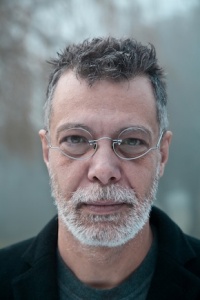 Dejan Tiago-Stanković is an author and translator. He was born in Yugoslavia in 1965 and graduated in architecture in Belgrade before moving to London. Since 1996 he has lived in Lisbon, translating between his native Serbo-Croatian and Portuguese, giving Serbia the works of José Saramago and Portugal some of the biggest names in Yugoslav and Serbian literature, including Ivo Andrić. His first book, a collection of short stories, made him an instant literary star in Serbia. Estoril, his UK debut, is at once a spy story, a historical investigation, a delightful comedy and a meditation on exile. Estoril is out now in hardback and eBook from Head of Zeus, translated by Christina Pribichevich-Zoric.
Dejan Tiago-Stanković is an author and translator. He was born in Yugoslavia in 1965 and graduated in architecture in Belgrade before moving to London. Since 1996 he has lived in Lisbon, translating between his native Serbo-Croatian and Portuguese, giving Serbia the works of José Saramago and Portugal some of the biggest names in Yugoslav and Serbian literature, including Ivo Andrić. His first book, a collection of short stories, made him an instant literary star in Serbia. Estoril, his UK debut, is at once a spy story, a historical investigation, a delightful comedy and a meditation on exile. Estoril is out now in hardback and eBook from Head of Zeus, translated by Christina Pribichevich-Zoric.
Read more
@DejanTiago
Author portrait © Durían Todoroviç
Dejan Tiago-Stanković will be in conversation with Misha Glenny, author of McMafia, at the Portuguese Ambassador’s residence on 20 March, and with Tony White at Second Home Holland Park, on 21 March.

